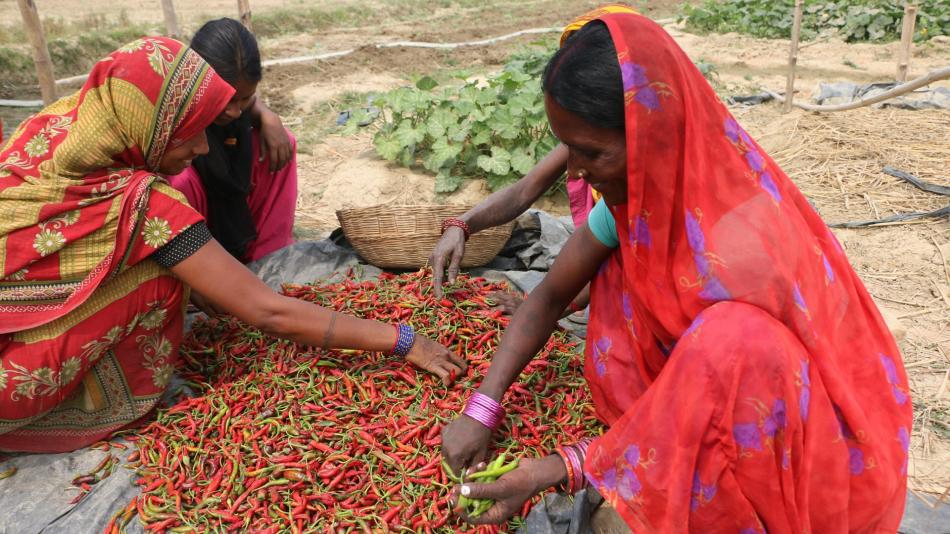
by ADWAN | Jul 17, 2021 | Success Stories
Rampari Devi Ram and Rajipari Devi Ram from Bastipur VDC of Sirhaha district did not believe until two years ago that they would be walking out of their closets to work in the fields and contribute in the livelihood of their families.
“I never thought I would ever get to remove the veil off my face and work in fields to contribute in my family,” shared Rampari Devi Ram, one of those who took the off-season vegetable farming training under the British Council Nepal project – Ensuring Rights through Skills and Voice (ERSVP), Click here for more…….
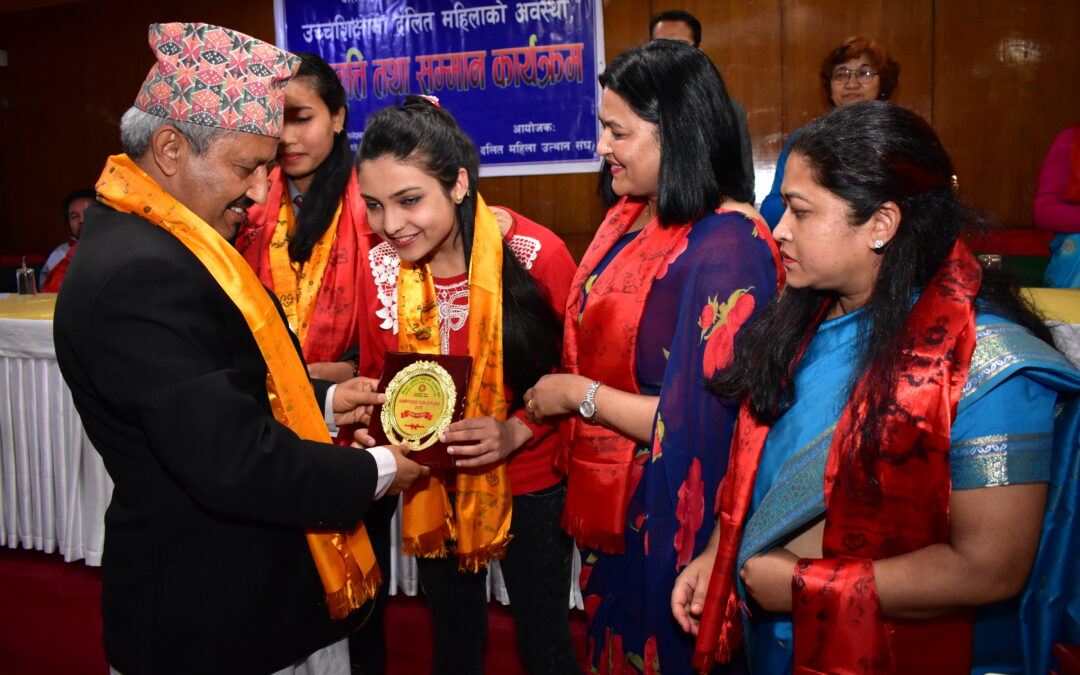
by ADWAN | Jul 17, 2021 | Success Stories
Laxmi Kapri, an Exemplary Empowered woman of Taklung – Education is a key to the door of all the dreams. The context is of Laxmi Kapri, a 25 years woman/ girl belonging to a very poor family of Taklung, Gorakha created a landmark identity as well as in ADWAN’s history. She Education is the process of achieving knowledge, values, skills, beliefs, and moral habits possesses outstanding personality with the amalgamation of personal and professional qualities. At present, she is working in two renowned hospitals due to her overt, cooperative and familiar, behavior and philanthropic nature. She is working in an established and recognized community hospital named “Helping Hands” and a private hospital “Blue Cross” in Kathmandu. It has improved economic status of her family.
Laxmi was born in 1997 in a below average family of rural background. Her family did not have regular source of income so that she could join school and study like other children. Hardly that family could fulfill the food for two times a day. Her father is handicapped and mother used to earn by a grocery having very low investment.
Generally, parents in a rural background do not want to invest for girl’s education as the thinking is pervaded that she has to leave and go to her husband’s house. The general tendency is not to invest more on daughters. Additionally, her family could not afford educational expenses.
Laxmi grew up in rural agro-based environment. She said” my parents did not have an opportunity to attend school, so they face struggling life throughout. Because of this, they made commitment early in my childhood to do every possible way to instill a love towards learning, handwork and dedication to work”. She had realized the importance of education. However, she was admitted in a government school of her vicinity. She was a very active student. she participated in debate and other extra- curricular activities. Throughout she worked hard. As a result, she scored very good marks and position in examination of School Leaving Certificate (SLC). Seeing her SLC certificate, her parents’ happiness knows no bounds. Their exultation gave an indication of their complacence in struggling phase of life.
She had her deep interest in serving the people of physically disable, old persons for humanitarian support. Therefore, she was interested to study Health Science. She got admitted in Martyr Memorial Institute of Health and Science. Her goal of life is to serve patients either in hospital or in the community. She studied there Proficiency Certificate level of Nursing. t was difficult for the family to maintain her expenses. In the course of time and her need, she came to ADWAN’s support for further education. Through ADWAN’s support as steps to move further and further, she succeeded in achieving her goa.l During her study and after it, she visited different hospitals that helped her to be more patient, matured and dedicated to work.
Now, she is working skillfully in theses hospitals. In turn, she has improved her better livelihoods. She is managing the parents as well as her own enhancement.
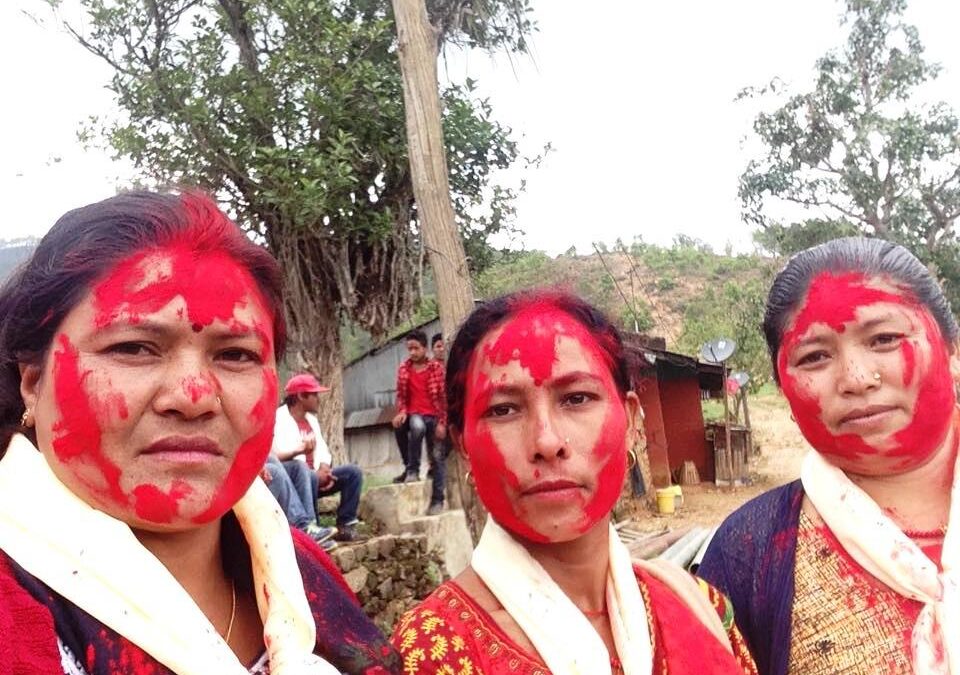
by ADWAN | Jul 2, 2018 | Success Stories
“I am a simple woman with simple thoughts who living a simple life. There are no monuments in my behalf and my name will soon to be forget. But I love with all my heart and soul, and for me; it will always be enough” – Gita Pariyar. For read more click here: Story of Gita
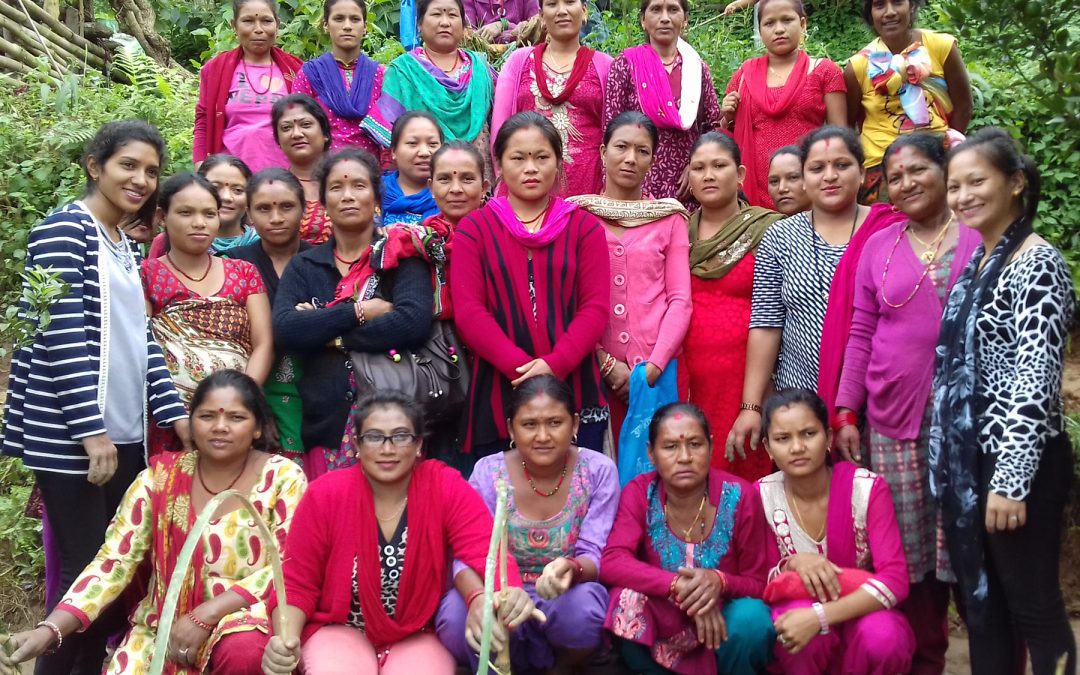
by ADWAN | Dec 5, 2017 | Success Stories
ADWAN has worked with Dalit women in Fujel and sorroundign areas for years and now has 17 groups in that area. In response to the violence, some of them decided to act became understands social action. Group organized a number of women, who, dressed in their finest lined up in front of the temple. Prepared for the worst, but with quiet determination, the women entered the temple one by one bearing their gifts of flowers and tikka powder. To everyone’s surprise, no-one lifted a hand, as they completed their worship and quietly went home. Since that spring day, Dalits worship in the Fujel temple along with everyone else. This is because it is generally known, that these particular women, members of ADWAN groups, are knowledgeable about their rights– as women and as Dalits. The traditionalists, who used violence to preserve the status quo, were quite aware that their actions are illegal. But now, thanks to ADWAN they comply with the law. ADWAN’s women are introduced to concepts of human rights in their early literacy training and through discussions at group meetings. In addition, ADWAN holds community wide workshops where women learn how to lodge a complaint if their rights are violated.
ADWAN held such a workshops through the EU funded project for the women in Fujel and other 5 vdcs. It was a highly visible affair and many non-Dalit community members participated, too. We are proud of the women’s actions that day, and of the entire community for letting the women show them how to live together in harmony. Since that spring day, Dalits worship in the Fujel temple along with everyone else. This is because it is generally known, that these particular women, members of ADWAN groups, are knowledgeable about their rights– as women and as Dalits. The traditionalists, who used violence to preserve the status quo, were quite aware that their actions are illegal. But now, thanks to ADWAN they comply with the law.
ADWAN’s women are introduced to concepts of human rights in their early literacy training and through discussions at group meetings. In addition, ADWAN holds community wide workshops where women learn how to lodge a complaint if their rights are violated. ADWAN held such a workshop for the women in Fujel in 2009 at the local school. It was a highly visible affair and many non-Dalit community members participated, too. We are proud of the women’s actions that day, and of the entire community for letting the women show them how to live together in harmony.
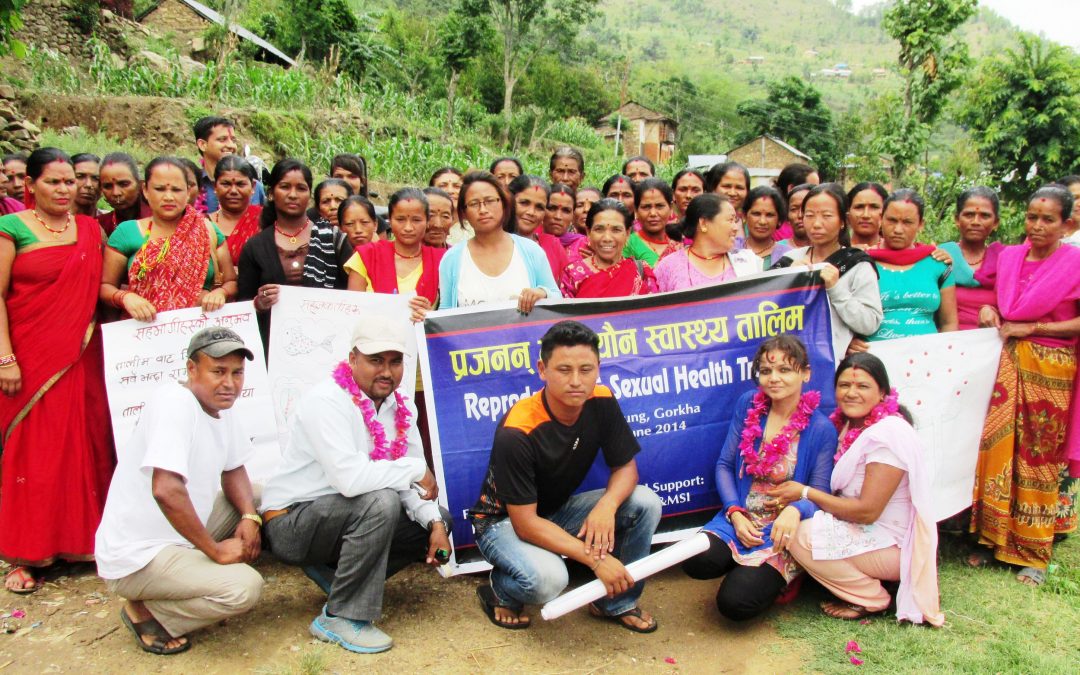
by ADWAN | Dec 4, 2017 | Success Stories
Almost 10 women’s Group in Taklung, Gorkha, have practiced micro savings since 1999, Village Cooperative bank since 2012 and gained respect and influence in their community. But they lacked the influence to prevent the death of three of their group members, who died in childbirth.
Rural Nepali women are petrified at the thought of giving birth – but also have no control wether to get pregnant. Though the government promotes access to inexpensive contraception, it has failed to tell women where to obtain it; few rural women actually use it. Nepal has one of the highest maternal mortality rates in the world – a woman dies every four hours from pregnancy-related causes. Dalit women, who fare worse on all social indicators, have an average lifespan of just 42 years.
For 15 years, ADWAN has focused on empowering women through micro finance, livelihood and rights education. We were unaware of the maternal health crisis so glaringly at odds with women’s empowerment. Gita, a community health worker, and active in our partner organization ADWAN, was instrumental in brining attention to the problem. ADWAN is so excited to introduce three new workshops in partnership with Nidan (“Cure”), a public health NGO.
In September 2012, ADWAN conducted a first ever reproductive health project in Taklung in partnership with Nidan. This was the first time ever a doctor had set foot in that community. During the two-day workshop, the Nidan doctors and trainers from Marie Stopes International (MSI), a family planning agency, conducted a “Train the Trainer” workshop for 28 community health workers and women, chosen for their leadership and influence. Together, they learned how to train an additional 150 women.
The partnership and the “Train the Trainer” approach bring health care knowledge to women in remote areas in a most cost effective way. In addition, it connects women to local agencies, so they can obtain services on their own in the future.
When challenging cultural norms and bringing new information to a conservative community, lack of trust and poor communication are huge obstacles in dealing with ingrained cultural practices. Mothers-in-law, shamans and unskilled traditional midwives wield huge power over young women especially regarding childbirth and pregnancy. It takes great skill to change minds and habits, but the easy and friendly manner of the Nidan doctors easily won the women’s trust; and the women in turn opened up:
“There were twelve women with me in there {the meeting house}. Another discussion was swelling and receding in the adjacent room where Dr. Mali was talking. In that momentary period of silence, a woman started speaking in a tone of amused wonder -”, observed Dr. Giri.
In discussions and exercises women absorbed information, which could save their lives: care during pregnancy, danger signs, importance of check-ups and having a skilled birth attendant during delivery. Family planning options, birth spacing and the advantage of small families were also on the table. Since is so prevalent among rural women, the trainers explained how to prevent and manage this condition.
A young MSI nurse, Pampha Nepali, educated participants about inexpensive contraception, easy to obtain and use. After two full days of training, participants and trainers agreed this first workshop had been a resounding success. Women assured the doctors that they had understood the material and were ready to teach other women.

by ADWAN | Dec 4, 2017 | Success Stories
Every morning at earlier, Til Maya Ale gets out of bed and dresses in the dark before heading out of the stone and mud house that she shares with her husband and two teenage children. She crosses the yard to a newly constructed two-story building to feed the twenty-five chicks. She checks on them before continuing to the rooms that house twenty-five older chickens. Two hours later, she will once more get up to fetch water at the village tap and fill their drinking troughs. “Sometimes I can’t sleep because I worry about the chicks,” she confesses, “but I am hopeful about the future.”
Til Maya joined the Abtha Uthaun Womens’ Group in 2005. The name means: Friends, let’s wake up! “We were blind before,” she says, “and thought joining the group would help educate us.” Like many of the women, Til Maya recognizes the importance of the literacy program. Although she is far from fully literate herself, the program has opened her eyes to the value of education. Both of her children work hard in school, while also helping her with chores.
Her dream was to raise chickens. Using her profits from the pigs she invested in goats and a buffalo, besides growing vegetables. With years of savings, and a small loan from her siblings, Til Maya had nearly enough to build a new home for her chickens, a building, which will also serve as store.
“Because of my initial success, I got a small loan from the government for my chickens,” she explains. “In addition, our women’s group received seven new kinds of vegetable seeds for free!” Emboldened by her success, she asked the government for orange trees and soon received twenty-five trees, which she now tends.
Tilmaya is president of her group of 36 women. She asserts that their newfound confidence, access to credit, and a pre-school program the group has initiated are the greatest benefits. “I want to learn more about business and I also hope to build a latrine,” she says. “All this came about as a result of the group. I would be so happy if there were money to fund more women like me.”
Til Maya’s story exemplifies ADWAN’s approach to empowerment: Give women opportunities to develop confidence and build a track record, and they take the next step on their own. This year many groups have approached local government agencies and NGOs for training, seed funds and loans. ADWAN’s women run successful sewing businesses, raise livestock and vegetables on a larger scale, tend their own fish farms and operate general stores.






